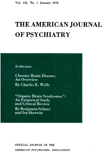Clinical use of the antipsychotics
Abstract
Neuroleptics are the cornerstone for both the acute treatment and prevention of most schizophrenic episodes. The authors review the current practical information available for the clinical management of acute episodes and maintenance therapy, including dosage schedules, plasma level determinations, and side effects. All neuroleptics given in equivalent doses produce approximately the same degree of antipsychotic activity. The most common cause of treatment failure in acute psychosis is an inadequate dose, and the most common cause of relapse is patient noncompliance. Maintenance medication should be given at the lowest dose that will sustain improvement. The authors also discuss several new alternative drug treatments to neuroleptics.
Access content
To read the fulltext, please use one of the options below to sign in or purchase access.- Personal login
- Institutional Login
- Sign in via OpenAthens
- Register for access
-
Please login/register if you wish to pair your device and check access availability.
Not a subscriber?
PsychiatryOnline subscription options offer access to the DSM-5 library, books, journals, CME, and patient resources. This all-in-one virtual library provides psychiatrists and mental health professionals with key resources for diagnosis, treatment, research, and professional development.
Need more help? PsychiatryOnline Customer Service may be reached by emailing [email protected] or by calling 800-368-5777 (in the U.S.) or 703-907-7322 (outside the U.S.).



